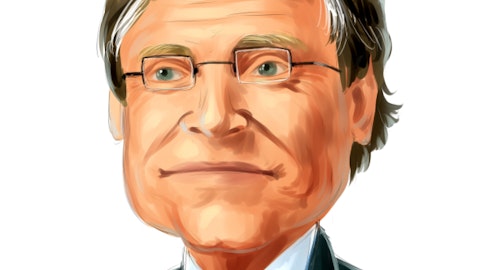Danaher Corporation (NYSE:DHR) Q4 2023 Earnings Call Transcript January 30, 2024
Danaher Corporation beats earnings expectations. Reported EPS is $2.09, expectations were $1.9.
Operator: Good morning. My name is Todd and I will be your conference facilitator this morning. At this time, I would like to welcome everyone to Danaher Corporation’s Fourth Quarter 2023 Earnings Results Conference Call. [Operator Instructions] I will now turn the call over to Mr. John Bedford, Vice President of Investor Relations. Mr. Bedford, you may begin your conference.
John Bedford: Good morning, everyone, and thanks for joining us on the call. With us today are Rainer Blair, our President and Chief Executive Officer; and Matt McGrew, our Executive Vice President and Chief Financial Officer. I’d like to point out that our earnings release, the slide presentation supplementing today’s call, the reconciliations and other information required by SEC Regulation G relating to any non-GAAP financial measures provided during the call, and a note containing details of historical and anticipated future financial performance are all available on the investors section of our website www.danaher.com under the heading Quarterly Earnings. The audio portion of this call will be archived on the Investors section of our website later today under the heading Events & Presentations and will remain archived until our next quarterly call.
A replay of this call will also be available until February 13, 2024. During the presentation, we will describe certain of the more significant factors that impacted year-over-year performance. The supplemental materials describe additional factors that impacted year-over-year performance. Unless otherwise noted, all references in these remarks and supplemental materials to company specific financial metrics relate to results from continuing operations and relate to the fourth quarter of 2023 and all references to period-to-period increases or decreases in financial metrics are year-over-year. We may also describe certain products and devices, which have applications submitted and pending for certain regulatory approvals or are available only in certain markets.
During the call, we will make forward-looking statements within the meaning of the federal securities laws, including statements regarding events or developments that we believe or anticipate will or may occur in the future. These forward-looking statements are subject to a number of risks and uncertainties, including those set forth in our SEC filings, and actual results might differ materially from any forward-looking statements that we make today. These forward-looking statements speak only as of the date they are made and we do not assume any obligation to update any forward-looking statements except as required by law. With that, I’d like to turn the call over to Rainer.
Rainer Blair: Thank you, John, and good morning, everyone. We appreciate you joining us on the call today. We delivered better than anticipated core revenue in each of our segments in the fourth quarter led by respiratory revenue at Cepheid. The combination of higher than expected revenues and our team’s strong execution enabled us to exceed our margin and cash flow expectations in what remains a dynamic market environment. Now before I get into the details of our performance, I wanted to briefly reflect on the progress we made to enhance our portfolio and accelerate our strategy this year. 2023 was a transformational year for Danaher as we continued to strategically enhance our portfolio and strengthen our growth and earnings trajectory.
With the successful spin-off of Veralto in September, we’re now a focused Life Sciences and Diagnostics Innovator. Establishing Veralto as a standalone public company was one step in our portfolio transformation over the last several years, which has increased our exposure to end markets with durable secular growth drivers. The acquisition of Abcam, which closed in December, further increases our exposure to these highly attractive markets. Now over the long term, we believe Danaher will be a faster growing business with higher margins and stronger free cash flow generation. 2023 was also a challenging year operationally as pandemic tailwinds became headwinds in our businesses. Our team’s commitment to executing with the Danaher Business System helped us navigate these challenges while maintaining a healthy cadence of growth investments and productivity initiatives geared towards improving our cost structure.
While we expect this transitional period to continue through the first half of 2024, these proactive steps paired with the transformation in our portfolio provide a strong foundation for sustainable long-term revenue and earnings growth. So with that, let’s take a closer look at our full-year 2023 financial results. Sales were at $23.9 billion and core revenue declined 10%, including core revenue in our base business which was down slightly and a COVID-19 revenue headwind of approximately 9.5%. Our adjusted operating profit margin was 28.7% and adjusted diluted net earnings per common share were $7.58. We also generated $5.1 billion of free cash flow resulting in a free cash flow to net income conversion ratio of more than 120%. Strong free cash flow generation is one of the most important metrics at Danaher and 2023 marks the 32nd consecutive year our free cash flow to net income conversion ratio exceeded 100%.
We continued to accelerate investments in innovation throughout the year, which enabled us to deliver several impactful new technologies to our customers. In Biotechnology, Cytiva’s new Xcellerex X-platform bioreactor is helping improve manufacturing yields and reduce the time and cost of biologic drug production. In Life Sciences, new products such as IDBS’ Polar Insight and Molecular Devices’ CellXpress.ai are helping accelerate the drug discovery process and bring life-changing therapies to market faster. And in Diagnostics, new solutions such as Beckman Coulter’s DxI 9000 next generation immunoassay analyzer are enabling faster, more accurate patient diagnosis. These are just a few of the many examples across Danaher of how we’re positioning our businesses for continued growth and delivering on our commitment to help customers solve some of the most important health challenges impacting patients around the world.
Now let’s turn to our fourth quarter results in more detail. Sales were $6.4 billion in the fourth quarter and core revenue declined 11.5%, including a 4.5% decline in our base business and a COVID-19 revenue headwind of approximately 7%. Geographically, core revenues in developed markets declined low double digits driven by lower respiratory and COVID-19 vaccine and therapeutic revenues coupled with ongoing investment normalization in pharma and biopharma end markets. High growth markets were down high single digits including a mid-teens decline in China where the economic landscape remains challenging. Our gross profit margin for the fourth quarter was 59%. Our adjusted operating margin of 28.7% was down 420 basis points primarily due to the impact of lower volume in our Biotechnology and Diagnostics segments and costs related to productivity initiatives.
Adjusted diluted net earnings per common share were $2.09 and we generated $1.2 billion of free cash flow in the quarter. Now let’s take a closer look at our results across the portfolio and give you some color on what we’re seeing in our end markets today. Reported revenue in our Biotechnology segment declined 21% and core revenue was down 22.5%. Bioprocessing core revenue was down over 20% as anticipated and discovery and medical declined high teens. In bioprocessing, base business core revenue declined high teens in the fourth quarter and was down approximately 10% for the full-year 2023. Revenue and order trends were largely consistent with what we saw in the third quarter including our book-to-bill ratio. We were encouraged to see a modest sequential improvement in orders this quarter with some of our customers returning to normal ordering patterns, but we haven’t yet seen a broad-based inflection in demand.

The environment in North America and Europe is stable with customers still working through inventory built up during the pandemic. Demand and underlying activity levels in China remain weak as customers are continuing to conserve capital and prioritize programs. For the full-year 2024, we expect core revenue in our Bioprocessing business to be down low single digits. This includes an assumption of a mid to high teens revenue decline in the first half of the year followed by a gradual improvement to a core growth rate of high single digits or better as we exit 2024. Despite the near-term headwinds from destocking, our confidence in the health and long-term growth trajectory of the biologics market remains as strong as ever. Underlying demand for biologic medicines continues to rise.
2023 was another record year of FDA approvals for biologic and genomic medicines and the development pipeline is meaningfully higher than at any point in history. These positive market trends reinforce our conviction in the tremendous opportunity ahead and the high single-digit long-term growth trajectory for our leading bioprocessing franchise. Over the last several years, Cytiva has been accelerating investments in innovation to bring impactful new solutions to customers as they advance therapies from the lab through to commercial production. A great example is the recently launched Cytiva protein select technology, an affinity chromatography resin designed to optimize recombinant protein purification. This new technology simplifies the purification process in recombinant proteins, of which there are currently more than 1,800 in development, and enables faster and more efficient process development.
Turning to our Life Sciences segment, reported revenue declined 1% and core revenue was down 4% including a low single-digit decline in our base business. Our life sciences instruments business collectively declined mid-single digits with trends in the fourth quarter largely consistent with the third quarter. We saw continued growth from academic and life science research customers globally while investment levels at pharma and biopharma customers remain constrained, particularly in China and in North America. We also expanded our capabilities and portfolio with the acquisition of Abcam, which closed in December 2023. The addition of Abcam to our Life Sciences segment expands our presence in the highly attractive proteomics market and is furthering our strategy to help map complex diseases and accelerate the drug discovery process.
We couldn’t be more pleased to welcome this highly talented and incredibly innovative team to Danaher. Our genomics consumables base business was essentially flat in the quarter. Robust demand across plasmids, proteins, and gene writing and editing solutions was offset by decline in next generation sequencing and basic research. During the quarter, IDT opened a new cGMP oligonucleotide manufacturing facility at their Coralville, Iowa campus. IDT can now offer a complete CRISPR workflow from design to analysis that supports cell and gene therapy customers in all stages of therapeutic development. This expansion of our capacity and capabilities is both enabling our customers important work today and fulfilling IDT’s vision of improving patient lives by facilitating faster development and commercialization of life changing therapeutics.
Moving now to our Diagnostics segment. Reported and core revenue both declined 8.5% with high single-digit growth in our base business more than offset by lower respiratory revenue at Cepheid. Our clinical diagnostics businesses collectively delivered high single-digit core revenue growth. Beckman Coulter Diagnostics led the way with over 10% core revenue growth, including double-digit growth in both instruments and consumables and notable strength in clinical, chemistry, and immunoassay. This strong performance in the fourth quarter rounds out a terrific year for Beckman where the team has been doing a fantastic job improving their competitive positioning through new product innovation and enhanced commercial execution. In molecular diagnostics at Cepheid, increased menu utilization by customers paired with recent new product innovation helped drive low teens core revenue growth in our non-respiratory business, including high teens or better core revenue growth in Group A Strep and sexual health.
In our respiratory business, Cepheid’s revenue of approximately $650 million in the quarter exceeded our expectation of $350 million. The high prevalence of circulating respiratory viruses drove both higher volumes and a preference for our 4-in-1 test for COVID-19, flu A, flu B, and RSV. Based on what we saw the last two years and discussions with customers and public health experts, we believe annual respiratory revenue in a typical respiratory season will be approximately $1.5 billion. This increase from our initial assumption of $1.2 billion per year is driven by an expectation of modestly higher volumes and a greater mix of our 4-in-1 tests. The durability and continued share gains at Cepheid are a testament to the significant value that Gene-Xpert provides customers at the point-of-care, close to patients where the most impactful diagnostic and treatment decisions are made.
Cepheid’s 4-in-1 test has become the standard of care for clinicians given its ability to provide a fast accurate lab quality diagnosis for four distinct respiratory illnesses with a single easy-to-use cartridge. Looking ahead with our differentiated positioning and respiratory testing, a leading installed base of more than 55,000 systems, and with growing adoption of the broadest molecular diagnostic test menu on the market; Cepheid is well-positioned to help customers meet their clinical needs and continue gaining market share. Now let’s briefly look ahead at expectations for the first quarter and the full-year 2024. Beginning with the first quarter of 2024, we will provide guidance for core revenue growth, but will no longer report base business core revenue as the pandemic has transitioned to an endemic state.
Now in the first quarter, we expect core revenue to decline in the high single-digit percent range. Additionally, we expect the first quarter adjusted operating margin of approximately 28%. Turning to the full-year 2024. We anticipate core revenue to decline in the low single-digit percent range, which assumes a core revenue decline in the first half of the year before returning to growth in the second half of 2024. Additionally, we expect our full-year adjusted operating profit margin to improve by approximately 50 basis points versus the full-year 2023. So to wrap up, we’re pleased to deliver fourth quarter results ahead of our expectations in what remains a dynamic environment. Despite the challenges we saw throughout 2023, we continued to strengthen our portfolio with M&A and took proactive steps focused on improving our cost structure.
Our team’s consistent application of the Danaher Business System also drove lasting process improvements in our businesses and enabled the launch of several breakthrough solutions. Reflecting back on the past few years, it’s clear that Danaher is exiting the pandemic a much better stronger company. We established our dental and environmental and applied solutions segments as standalone public companies in Invista and Veralto. We largely replaced their revenue contribution with higher growth, higher margin annuities with the acquisitions of Factiva, Aldevron, and Abcam. Additionally, Cepheid’s respiratory franchise is now six times larger today than it was prior to the pandemic and we expect this to be sustainable. So putting it all together, we’ve improved our long-term growth trajectory, significantly expanded margins, and strengthened our free cash flow generation.
So, our future is bright and I’m excited about what lies ahead for Danaher. The unique combination of our incredibly talented team, differentiated science and technology portfolio, and balance sheet optionality all powered by the Danaher Business System provides us with a strong foundation to maximize value for our customers, our associates, and our shareholders. So with that, I’ll turn it back over to you, John.
John Bedford: Thanks, Rainer. That concludes our formal comments. Operator, we’re now ready for questions.
See also 10 Highest Quality Egg Brands in the US and 35 Low-Stress High-Paying Jobs In The World.
Q&A Session
Follow Danaher Corp (NYSE:DHR)
Follow Danaher Corp (NYSE:DHR)
Receive real-time insider trading and news alerts
Operator: [Operator Instructions] Our first question comes from Dan Brennan with TD Cowen. Please go ahead.
Dan Brennan: Great. Thank you, guys. Thanks for the questions here. Rainer, maybe starting off just on bioprocess. Could you give us a little breakdown here in terms of the outlook that you’re providing say for China and then rest of world? And then I was hoping as well you can give us a snapshot maybe of how much inventory do you think your customers have today and how much of that changed versus the peak and kind of what does your guidance assume kind of when that inventory reaches a normal state?
Rainer Blair: Thanks, Dan. Good morning. And why don’t I start off with sort of an overview here on how we’ve laid out the guide and then we can dig into your bioprocessing question in a little more detail. So, our guide for the full year of 2024 on revenue is down low single digits and now let me break that open and talk about the segments. Biotechnology will be down low to mid-single digits and that’s different than bioprocessing. So, keep in mind I’m not talking about the Biotechnology segment in its entirety. The guide is down low to mid-single digits. Life Sciences down low single digits and Diagnostics up low single digits. And once again overall, that’s then down low single digits. Now at a high level, we actually expect the dynamic to be opposite of 2023 with a slow first half returning to growth in the second half.
And now let me talk just a little bit about the assumptions around our guidance. Starting with bioprocessing, which we’re guiding to be down low single digits and we think the first half will look a lot like second half of 2023 down mid to high teens coming off of a fourth quarter which showed incrementally improved orders versus Q3. Second half we expect to return to mid to high single-digit growth and we believe by then that the destocking in North America and Western Europe will have largely been completed and of course the comps ease there as well. So importantly for bioprocessing, we think exit rate for the year will be high single digits or better core growth. Now if we look at Life Sciences, we expect Life Sciences to be down low single digits for the guide and we expect a slow start and we should see growth improve here through the second half given some of the comps that we have seen as the normalization, particularly in the instrument business, continues and we’ve been talking about that for some time and we expect that to continue into 2024 as well.
Now if we look at that by end market and see pharma and biotech, stable but at lower levels of demand; and then academic and applied markets holding up comparatively better. Geographically, we see China weak with a slower macro and of course in Life Sciences in particular, we have some prior year comps related to the subsidized loan program there. And then lastly on Life Sciences, we expect developed markets to be relatively consistent with 2023. As we look at Diagnostics, which we are guiding up low single digits, we see no change to the underlying trends, patient volumes have normalized. And in the non-respiratory business, we expect growth of mid-single digits and of course that’s offset by lower respiratory revenue, which was $1.9 billion in 2023 and we anticipate that that will be $1.6 billion in 2024.
So Dan, that’s how the year shapes up by segment and of course then we can now perhaps talk a little bit more detail around bioprocessing.
Matt McGrew: Dan, maybe to just kind of to put some numbers around your question as well. So I think China for the year for bioprocessing, you should probably think about the first quarter being down similar to what we saw in Q2, Q3, and Q4 last year call it north of 40%. And then I think for the full year, I just think even that will still be down kind of mid-teens for bioprocessing in China. That’s sort of what we’ve got dialed in. And as far as the rest of the world, I think we’ll be down in the first half and then kind of return to growth here in the second half after we get past the destocking. And I know you asked how much kind of inventory is in China. It’s kind of hard to say, Dan. I mean we’ve got a kind of a moving target, but we’ve got a good sense that what we will largely be through most of the destocking, particularly in North America and Europe where it was probably the biggest.
I think we’re going to be through that here in the first half, which then sort of speaks to why we think it gets a little bit better in the second half of the year.
Dan Brennan: Got it. Thanks, guys. And then maybe a follow-up just on bioprocessing. That’s such a huge focus. Just in terms of the guide that you’ve laid out, what does that assume from kind of a book-to-bill or bookings trajectory as we work through the year? And just kind of related to that, several peers have already pointed to book-to-bills kind of above one. Obviously, everyone’s order books are, mix of business is different. But what’s kind of unique about your business, do you think? Is it clinical versus commercial, or is it just the size of your book or just any color? Why do you think some of the peers have seen the turn in their business faster than what you guys have seen? Thank you.
Matt McGrew: Yes, let me give you a little bit of color on how I’m thinking about the guide or how we’re thinking about the guide. Maybe start with – this is for bioprocessing. Start with kind of a qualitative overview of what this guide sort of is, right? This guide calls for a slight improvement versus our demonstrated book-to-bill of the last couple quarters. We’ve been in that kind of 0.8, 0.85 range the last four or five quarters. And we are not calling for an inflection at any point in the year, but we are assuming some modest improvement as we move through the first half into the second half. Like I said before, as we think that North America and Europe destocking is largely behind us after the first half. So, no inflection, sort of just kind of gets a little bit better than where we were.
As far as kind of some numbers around that, Dan, maybe start with the backlog. So, we’re starting with about a quarter and a half of backlog. That’s pretty consistent with where we were in 2018, 2019. So, I think we’re back to backlog levels that are, relatively speaking, pretty much in line with history. And then you start with that backlog and add this book-to-bill assumption in there. We are assuming book-to-bills improve slightly, like I said, kind of from the 0.8, 0.85s into the 0.9s. And that those will get a little bit better every quarter, as we build through the year. But we are not assuming book-to-bills go above one in any given quarter. And so that kind of assumes that, we get past the inventory destocking in the first half. The second half gets a little bit better.
And that we’re kind of exiting here, like I said, the first half will be down mid-teens. Mid-to-high teens for the second half we exit with high single-digits or better without seeing an inflection. And I think maybe, I know that there’s been some questions on that second half ramp as well. Maybe just to give people some quantitative numbers on that. So the second half ramp in bioprocess assumed in this guide is about a $250 million year-over-year second half increase. So that’s on a, call it a $6.5 billion business. So yes, there is a step up. But I think it’s relatively modest on a business with $6 billion to expect that we think we could do a couple hundred million dollars better year-over-year in the second half as we move past the destocking.





